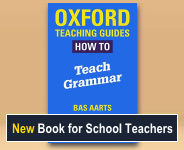10: Consolidation
This is Lesson #10 of a unit of 10.
Teacher Slide
Objective: grammar
To consolidate and revisit existing grammatical knowledge.
Objective: writing
To explore the way in which pupils can construct meaning in texts through grammar.
Terminology for pupils:
noun, noun phrase, adverb, verb, tense, adjective, statement, question, exclamation, command
Select the type of word being referred to by the feature.
Answers
Grammar is an important part of writing.
- Writers can change the way sentences look, just like you can change the shape of a piece of putty.
- Writers make choices. For example, they can use an adjective to describe a noun, or they can leave it out. But every choice has an effect on the meaning of the sentence.
- You too are a writer, and you too can change the words in sentences!
Here is the opening to The BFG by Roald Dahl.
- What happens in this story opening?
- How does it make you feel as a reader?
Sophie couldn’t sleep. A brilliant moonbeam was shining through a gap in the curtains. It was shining right onto her pillow.
The other children in the dormitory had been asleep for hours. Sophie closed her eyes and lay quite still. She tried very hard to doze off.
It was no good. The moonbeam was like a silver blade slicing through the room onto her face. The house was absolutely silent. No voices came up from downstairs. There were no footsteps on the floor above either.
The window behind the curtain was wide open, but nobody was walking on the pavement outside. No cars went by on the street. Not the tiniest sound could be heard anywhere. Sophie had never known such a silence.
Perhaps, she told herself, this was what they called the witching hour.
- Which adjectives and adverbs are used to describe the room and the night? What does this make you think about what is happening?
- What kind of character do you think Sophie is, and which words tell you this?
- Which nouns are used to talk about things in the story?
- Two tenses are used in the story. Which ones? Which one is used the most? Why do you think the writer chose this?
Your task is to now continue the story. Try to write in the same way as the author, thinking carefully about your choices in language. Here are some suggestions:
- Use nouns related to things in the room and the night time.
- Use adjectives to describe the sounds in the night.
- Use adverbs to describe how things are done.
- Try to use some linking words such as and, or, because, when, while, etc., but not too many!
Once you have finished, share your writing with a partner and talk to them about some of the choices you made.
Here is how the author Roald Dahl continued the story:
The witching hour, somebody had once whispered to her, was a special moment in the middle of the night when every child and grown-up was in a deep deep sleep, and all the dark things came out from hiding and had to the world themselves.
What are some of the similarities and differences between this piece of writing and the choices you made in your own piece?
Welcome!

Englicious is totally free for everyone to use!
But in exchange, we ask that you register for an account on our site.
If you’ve already registered, you can log in straight away.
Since this is your first visit today, you can see this page by clicking the button below.
- Printer-friendly version
- Log in to view or leave comments

